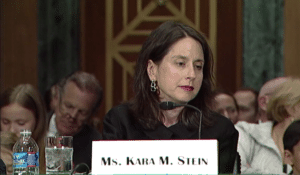Though SEC Commissioners Daniel M. Gallagher and Kara Stein may have travelled on the same plane on the way to the Los Angeles County Bar Association Annual Securities Regulation Conference to address a room of securities industry professionals on October 24, judging by their public remarks they were certainly not on the same page – or, perhaps more importantly, in the same “time zone.”
 Though I applaud Commissioner Stein for highlighting important issues and generally asking the right questions, I was somewhat taken aback by her views on the raging battle in Washington over the scope of federal pre-emption of the states’ authority to review and approve JOBS Act Title IV Regulation A+ offerings.
Though I applaud Commissioner Stein for highlighting important issues and generally asking the right questions, I was somewhat taken aback by her views on the raging battle in Washington over the scope of federal pre-emption of the states’ authority to review and approve JOBS Act Title IV Regulation A+ offerings.
For those not immersed in the details of the law and proposed regulations, Congress attempted to remove a major roadblock to the use of the existing, largely dormant, Regulation A, by raising the dollar ceiling from $5 million to $50 million and eliminating the power of the states to review and approve these offerings on a state by state basis. The quid pro quo for an issuer to avoid the labyrinth of state “blue sky” regulation: sell a security listed on a national securities exchange, or limit the offering to “Qualified Purchasers.” Congress left the task of defining exactly who would be a Qualified Purchaser to the Commission.
Last December the Commission issued proposed rules for public comment – taking the bold, and somewhat controversial, step of designating all investors as Qualified Purchasers, thus avoiding state by state review and approval. The rules proposed a new criterion not found in the JOBS Act: limiting the amount any person could invest, rich or poor, smart or otherwise, to 10% of the greater of their income or net worth, exclusive of principal residence.
 This broad proposed definition of Qualified Purchaser met with a loud, continuous cry of foul from the North American Securities Administrators Association, their lawyers and professional lobbyists. As the SEC records reflect, there have been countless comment letters and visits by NASAA to both the Commissioners and the Staff, to address this issue. After all, they said, who better to review and regulate primarily local businesses than the state securities administrators?
This broad proposed definition of Qualified Purchaser met with a loud, continuous cry of foul from the North American Securities Administrators Association, their lawyers and professional lobbyists. As the SEC records reflect, there have been countless comment letters and visits by NASAA to both the Commissioners and the Staff, to address this issue. After all, they said, who better to review and regulate primarily local businesses than the state securities administrators?
However, nearly 11 months after the SEC issued its proposed rules, and more than seven months after the public comment period officially closed, in her October remarks addressing the Los Angeles County Bar Association Commissioner Stein seemed to try to change the conversation, spinning a different take on the apparent hiatus in the SEC’s rulemaking:
“It’s interesting to note that much of the debate around the Commission’s proposed rules implementing Regulation A+ centers around the role of the state securities regulators.[9] But this controversy somewhat puzzles me. I think that half of the problem is already solved, and the rest can be resolved in a simple, modest way.”
 Interestingly, footnote [9] is a citation to a Crowdfund Insider article on Regulation A+, which in turn cites to an article I wrote back in April 2014 – framing the controversy which “puzzles” Commissioner Stein.
Interestingly, footnote [9] is a citation to a Crowdfund Insider article on Regulation A+, which in turn cites to an article I wrote back in April 2014 – framing the controversy which “puzzles” Commissioner Stein.
In her October remarks Commissioner Stein appeared to echo the NASAA talking points, albeit with reasoning that was incomplete and, more importantly, by simply ignoring the plain directive of Title IV of the JOBS Act.
“First, for those who emphasize the importance of federal preemption to making Regulation A+ work, it’s already there: Congress provided for preemption for Reg A+ securities listed on a national securities exchange. Why did Congress do that? I suspect because the federal securities laws have long recognized the benefits for retail investors that come with an exchange listing. These protections include, for example, listing standards and reputational checks, as well as the secondary market liquidity that is facilitated by an exchange.”
So far, so good. But wait, there is more:
“But what about securities not listed on exchange? I recognize that a 50-state blue sky approach has long been seen as complex and costly. In part, I think that the compliance challenges of a 50-state approach actually helps keep in check the public circulation of over-the-counter securities, which can be hotbeds for fraud. . . . .
“Moreover, the state securities regulators have evolved and modernized. Just this year, the North American Securities Administrators Association (NASAA) put in place a streamlined review regime for Regulation A offerings with a single point of contact for all states, time limits on regulatory review, and a one-shot approval – meaning sign off for one and all. This unified regime is designed to review smaller offerings in a fast, efficient way. State regulators really are – or should be – the best equipped and most logical overseers for these mostly smaller, regional businesses and the investments in them.”
 But what Commissioner Stein failed to address, indeed ignored, was the plain language of Title IV. It directs the SEC to implement rules that not only exempt exchange listed securities from state blue sky review, but also securities sold to Qualified Purchasers, regardless of whether they trade on an exchange. So while Commissioner Stein may be correct in her views that the rest of the problem can be solved in a simple, modest way, I respectfully remind her, as a sitting SEC Commissioner and former Congressional staffer, that such a view would require a new act of Congress to implement – one not likely to happen anytime soon in a Republican controlled Congress. In the meantime, I would hope that at least three of the five Commissioners can agree on a path forward which implements the current provisions of the JOBS Act – it being nearly a full year since the proposed rules were issued.
But what Commissioner Stein failed to address, indeed ignored, was the plain language of Title IV. It directs the SEC to implement rules that not only exempt exchange listed securities from state blue sky review, but also securities sold to Qualified Purchasers, regardless of whether they trade on an exchange. So while Commissioner Stein may be correct in her views that the rest of the problem can be solved in a simple, modest way, I respectfully remind her, as a sitting SEC Commissioner and former Congressional staffer, that such a view would require a new act of Congress to implement – one not likely to happen anytime soon in a Republican controlled Congress. In the meantime, I would hope that at least three of the five Commissioners can agree on a path forward which implements the current provisions of the JOBS Act – it being nearly a full year since the proposed rules were issued.
 And Commissioner Stein overlooked one other very important detail. Though to be sure there are sound policies embedded in many states’ blue sky laws, some states still retain the power to conduct a “merit review.” Essentially, this allows a state regulator to impose his or her judgment as to what securities are simply too risky for their state residents to be exposed to – discretion which many have referred as being “arbitrary.” For these states it is not enough to simply ferret out fraud before an investor parts with its money. Investors must also be protected from their own poor judgment. This is exactly the barrier Congress sought to eliminate by pre-empting state review for offerings sold only to Qualified Purchasers – regardless of whether they were listed on a national exchange.
And Commissioner Stein overlooked one other very important detail. Though to be sure there are sound policies embedded in many states’ blue sky laws, some states still retain the power to conduct a “merit review.” Essentially, this allows a state regulator to impose his or her judgment as to what securities are simply too risky for their state residents to be exposed to – discretion which many have referred as being “arbitrary.” For these states it is not enough to simply ferret out fraud before an investor parts with its money. Investors must also be protected from their own poor judgment. This is exactly the barrier Congress sought to eliminate by pre-empting state review for offerings sold only to Qualified Purchasers – regardless of whether they were listed on a national exchange.
Having recently attended a conference which included two high ranking NASAA officials, I can tell you that they are still blushing at the mention of the now infamous “merit review” of Apple Computer in 1980, which resulted in non-institutional investors being barred from purchasing Apple shares in its “hot” IPO in Massachusetts and more than a dozen other states. The reason? Apple shares were deemed to be “overvalued” relative to their financial prospects. Really?
 Commissioner Gallagher, in his remarks at the same conference, got it right on Regulation A+ one more time:
Commissioner Gallagher, in his remarks at the same conference, got it right on Regulation A+ one more time:
“We took a big step forward by issuing proposed rules to amend Regulation A in December of last year, but we have to finish the job as soon as possible. Regulation A+, as our proposed rules have come to be called, would democratize capital formation, allowing equity in small, pre-IPO companies to be sold to the ordinary investor.”
Ignoring major operative provisions of Title IV of the JOBS Act as well as the substantive hurdles embedded in a non-uniform 50 state Blue Sky regime will lead the Commission nowhere. My strongest recommendation to the Commission, after receiving hundreds of public comment letters on Regulation A+ (including three from me): it’s time to bite the bullet, convene, find a solution that both fits within the JOBS Act and meets the requirements of at least three of the five Commissioners, and embed it in final regulations.
 And if indeed, as a practical matter, compromise is the order of the day, I respectfully direct the Commissioners and the Staff to my third Comment Letter on Regulation A+, submitted to the Commission one day after Commissioner Stein delivered her October 24 address to my professional colleagues in my home town of Los Angeles.
And if indeed, as a practical matter, compromise is the order of the day, I respectfully direct the Commissioners and the Staff to my third Comment Letter on Regulation A+, submitted to the Commission one day after Commissioner Stein delivered her October 24 address to my professional colleagues in my home town of Los Angeles.
A copy of my letter to the Commission outlining a proposed compromise is provided below.
The time for comment and debate at the SEC on Title IV (not to mention Title III investment crowdfunding) has come and gone. It’s time to put pen to paper, vote and move forward!
_______________
 Samuel S. Guzik, a Senior Contributor to Crowdfund Insider , is a corporate and securities attorney and business advisor with the law firm of Guzik & Associates, with more than 30 years of experience in private practice. A nationally recognized authority on the JOBS Act, including Regulation D private placements, investment crowdfunding and Regulation A+, he is and an advisor to legislators, researchers and private businesses, including crowdfunding issuers, service providers and platforms, on matters relating to the JOBS Act. As an advocate for small and medium sized business he has engaged with major stakeholders in the ongoing post-JOBS Act reform, including legislators, industry advocates and federal and state securities regulators. In 2014, some of his speaking engagements have included leading a Crowdfunding Roundtable in Washington, DC sponsored by the U.S. Small Business Administration Office of Advocacy, a panelist at the MIT Sloan School of Business 2014 Crowdfunding Roundtable, and a panelist at a national bar association event which included private practitioners, investor advocates and officials of NASAA. His articles on JOBS Act issues, including two published in the Harvard Law School Forum on Corporate Governance and Financial Regulation, have also served as a basis for post-JOBS Act proposed legislation. Recently he was cited by SEC Commissioner Daniel M. Gallagher in a public address for his advocacy on SEC regulatory reform for small business. He is admitted to practice before the SEC and in New York and California. Guzik has represented a number of public and privately held businesses, from startup to exit, concentrating in financing startups and emerging growth companies. He also frequent blogger on securities and corporate law issues at The Corporate Securities Lawyer Blog.
Samuel S. Guzik, a Senior Contributor to Crowdfund Insider , is a corporate and securities attorney and business advisor with the law firm of Guzik & Associates, with more than 30 years of experience in private practice. A nationally recognized authority on the JOBS Act, including Regulation D private placements, investment crowdfunding and Regulation A+, he is and an advisor to legislators, researchers and private businesses, including crowdfunding issuers, service providers and platforms, on matters relating to the JOBS Act. As an advocate for small and medium sized business he has engaged with major stakeholders in the ongoing post-JOBS Act reform, including legislators, industry advocates and federal and state securities regulators. In 2014, some of his speaking engagements have included leading a Crowdfunding Roundtable in Washington, DC sponsored by the U.S. Small Business Administration Office of Advocacy, a panelist at the MIT Sloan School of Business 2014 Crowdfunding Roundtable, and a panelist at a national bar association event which included private practitioners, investor advocates and officials of NASAA. His articles on JOBS Act issues, including two published in the Harvard Law School Forum on Corporate Governance and Financial Regulation, have also served as a basis for post-JOBS Act proposed legislation. Recently he was cited by SEC Commissioner Daniel M. Gallagher in a public address for his advocacy on SEC regulatory reform for small business. He is admitted to practice before the SEC and in New York and California. Guzik has represented a number of public and privately held businesses, from startup to exit, concentrating in financing startups and emerging growth companies. He also frequent blogger on securities and corporate law issues at The Corporate Securities Lawyer Blog.
[scribd id=246784758 key=key-rCLyka3rFAXchpJWOywM mode=scroll]
[scribd id=246776667 key=key-sp1Wilkip1vIfaAxtqme mode=scroll]


